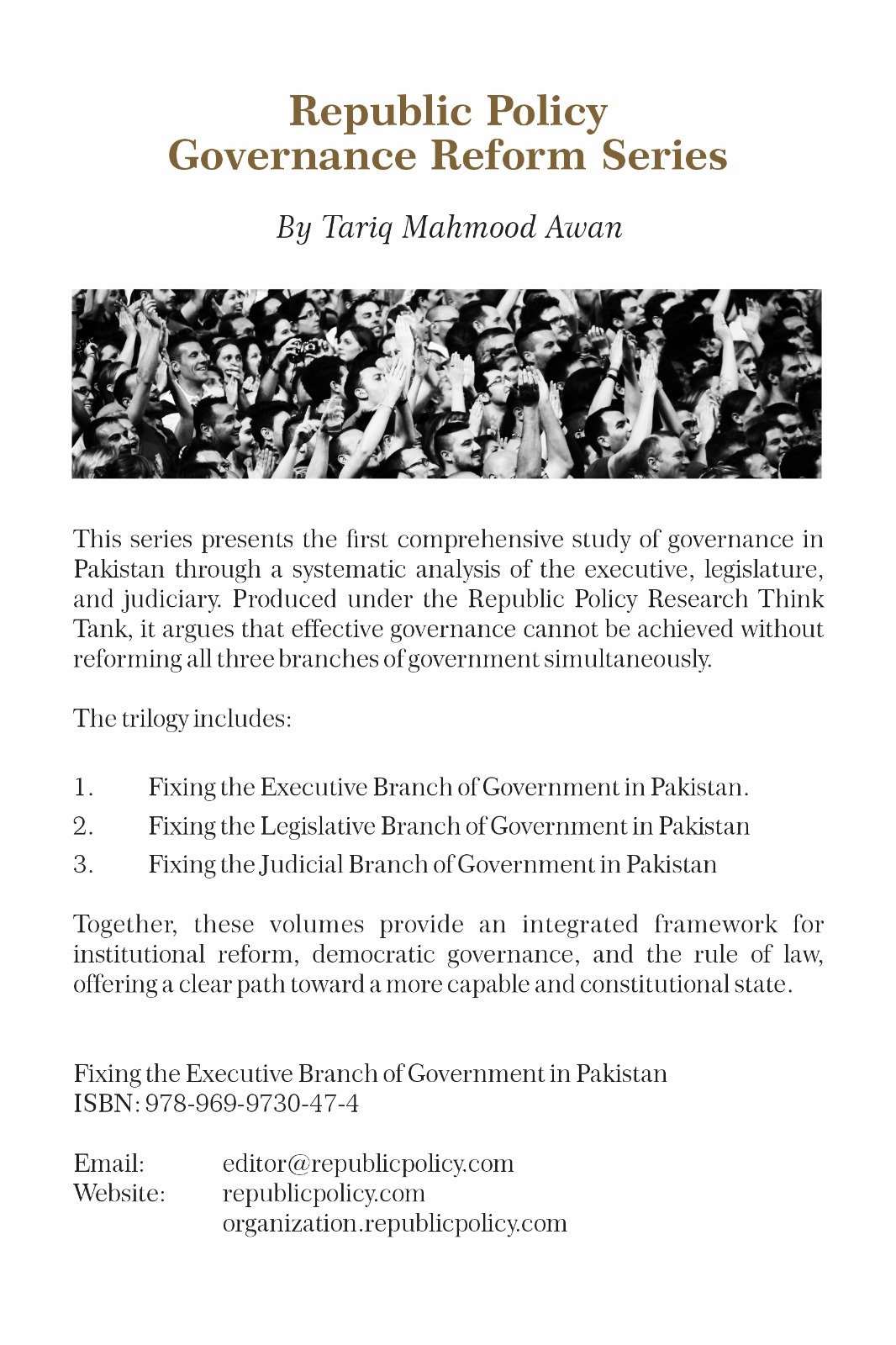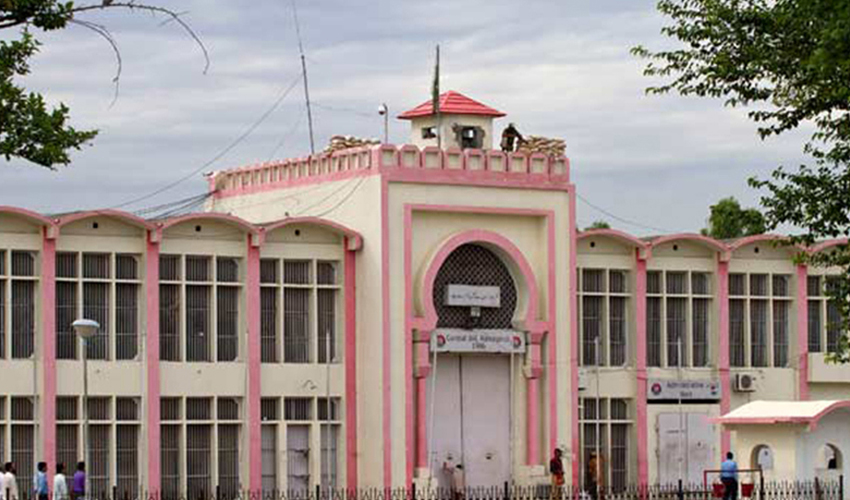Anwar Baryar
Tariq Mahmood Awan’s Fixing the Executive Branch of Government in Pakistan is one of the most comprehensive and courageous attempts yet to rethink how Pakistan is governed. As a fellow civil servant, I read this book not merely as an academic treatise, but as a personal reflection on the system we live and work within — a system that has long lost its constitutional direction and moral compass.
A Constitutional Framework for Reform The book’s central thesis is that Pakistan’s executive branch — political, civil, and police — has drifted dangerously far from the constitutional order envisioned in 1973. Awan argues that this branch, instead of being a servant of the people, has become a self-perpetuating power center. Through meticulous constitutional reasoning, he makes the case that Articles 90 to 100, 129 to 140-A, and 240 to 242 collectively define a democratic executive that must operate under legislative oversight — not above it.
What distinguishes Awan’s work is that he doesn’t approach reform as a technical issue of pay scales or postings. Rather, he restores reform to its rightful domain: the Constitution. He argues that fixing the executive branch is not a managerial adjustment but a constitutional imperative — one that defines whether Pakistan remains a federation or slides into unitary control.
Follow Republic Policy YouTube
Diagnosing the Crisis: Bureaucracy vs. Democracy Awan traces Pakistan’s governance crisis to a historical betrayal — the retention of colonial administrative frameworks that concentrated authority in unelected bureaucrats rather than elected representatives. Drawing from his decades in service, he details how Pakistan’s bureaucracy evolved from a colonial instrument of control to a modern network of self-preserving elites.
He documents how this imbalance undermines democracy: from the Chief Secretary’s unconstitutional appointment by the federal government to the bureaucratic domination of local governance. Awan exposes how these practices contradict the federal parliamentary spirit of the 1973 Constitution, leaving ministers subordinate to their secretaries and citizens alienated from power.
The Reform Roadmap The heart of the book lies in Awan’s five rules of reform: constitutionalization, structural alignment, specialization, codification, and modernization. Each rule is grounded in detailed constitutional reasoning.
He calls for:
Legislating all civil services under Article 240, distinguishing between federal, provincial, and All-Pakistan services.
Aligning bureaucratic structures with parliamentary accountability.
Replacing generalist cadres with specialized professional services.
Codifying all service laws to replace colonial rules and executive fiats.
Reforming pay, perks, and promotions to encourage merit and performance rather than hierarchy and patronage.
These proposals are not mere theory; they form a practical, legally coherent roadmap that can be legislated by Parliament and provincial assemblies.
Follow Republic Policy on Facebook
Why This Book Matters Awan’s critique is fearless yet balanced. He acknowledges the dedication of many officers but insists that good individuals cannot thrive in bad structures. The book’s greatest contribution is its courage to confront sacred cows — particularly the Pakistan Administrative Service’s grip on federal and provincial power.
He demonstrates that this arrangement, born out of the 1954 CSP Rules, survives without legislative sanction and undermines provincial autonomy. His discussion on abolishing the unconstitutional reservation of provincial posts for federal officers is one of the most significant constitutional interventions in recent Pakistani scholarship.
Follow Republic Policy on TikTok
A Civil Servant’s Perspective Reading this work as a serving officer, I felt both challenged and inspired. Awan’s arguments are not abstract criticism; they come from a place of responsibility. He calls upon bureaucrats to rediscover their constitutional purpose — to serve elected governments, not to rival them. His insistence that local government empowerment is a constitutional right, not a political favor, is a reminder that real governance begins in districts, not capitals.
The book’s chapters on administrative reforms, police accountability, and political executive empowerment form a trilogy of institutional repair. Each chapter builds on lived experience and legal precision, connecting systemic flaws with realistic solutions.
Follow Republic Policy on Instagram
Literary Strength and Scholarly Value Beyond its policy depth, Fixing the Executive Branch of Government in Pakistan is beautifully structured. The prose is lucid, the research meticulous, and the tone reflective of someone who knows both the corridors of power and the frustrations of reform. Awan weaves constitutional theory with administrative realism — a rare balance in Pakistani writing.
He draws on historical sources, constitutional provisions, and contemporary reform studies (notably from PIDE and Republic Policy Think Tank). Yet his originality lies in integrating these into a single framework of administrative federalism — a model where provinces, local governments, and citizens are co-owners of governance.
Follow Republic Policy on WhatsApp Channel
Final Reflections Tariq Mahmood Awan’s book is more than a scholarly text — it is a manifesto for rebuilding Pakistan’s governance on constitutional foundations. It should be read in parliaments, civil service academies, universities, and policy think tanks. It will challenge bureaucrats to rethink power, and it will remind politicians of their constitutional duty to lead.
As I closed the final chapter, one thought lingered: reform is not rebellion — it is redemption. Awan’s vision does not seek to dismantle the state; it seeks to make it democratic, accountable, and humane. For every Pakistani who believes the system is broken but can be fixed, this book is essential reading.
Anwar Baryar is a civil servant and working as an Additional Secretary in the Government of Punjab
















